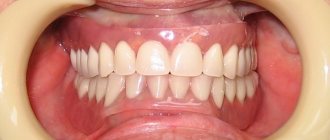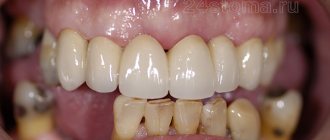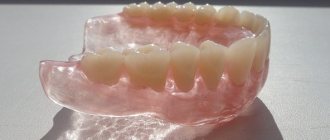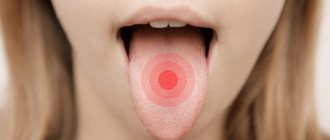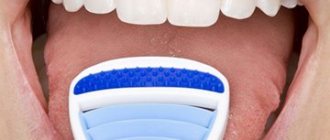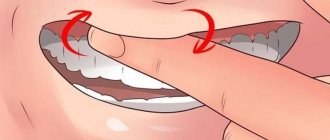Tongue piercing is one of the most popular types of piercings. Lots of young people get tongue piercings.
What are the benefits of tongue piercing?
- Unusual, erotic, shocking, very fashionable.
- Heals quickly.
- There is no trace of the piercing left, the channel is healed within a day.
Tools for tongue piercing: tongue holder or oval window clamp, catheter needle No. 16, No. 18.
Earrings: for the first puncture and healing, it is better to use a polyethylene barbell earring, 18-19 mm long. This is a length with a margin for tongue swelling. After 3-6 weeks, when the canal is fully formed, the barbell can be changed to another (14-16 mm).
Attention! If you have gold crowns in your mouth, then you cannot wear steel piercing jewelry for a long time. A “galvanic couple” occurs, and constant irritation of the mucous membranes is possible. In this case, you need to use plastic or titanium tongue decorations.
Treatment before piercing the tongue: the mouth should be rinsed with a 3% (diluted 1:1 with water) hydrogen peroxide solution. Rinse - 5 minutes. A banana earring with an unscrewed ball should be immersed in an antiseptic solution for 15-20 minutes (95% alcohol, disinfectant solutions).
Place of tongue piercing: the main landmarks are the central line and the frenulum of the tongue. The injection point is located under the tongue in the midline, without affecting the frenulum.
Puncture procedure
Tongue piercing is an operation.
To avoid complications, it is recommended to carry it out in a specialized salon. Only a qualified doctor can perform the procedure properly. Only a master can determine the optimal place for a puncture, where the risk of injury to nerves and blood vessels will be minimal. During the operation, sterile instruments and disposable rubber gloves must be used.
Sequencing:
- The oral cavity is treated with an antiseptic. In most cases, patients ask for additional oral anesthesia. Lidocaine solution is used as an anesthetic.
- A special clamp is used to fix the tongue.
- A puncture is made on the tongue fixed with a clamp. The direction of the needle is from bottom to top.
- A metal rod or a “decoration” chosen by the patient is inserted into the resulting hole.
Tongue piercing at home
It is not advisable to do piercing yourself.
To minimize the risk of complications, the following requirements must be met:
- A well-lit place is selected for the operation. There must be a table in the room on which the necessary tools are laid out.
- For the operation, only sterile instruments (clamp, needle, earring) are used.
- The oral cavity must be treated with a disinfectant solution and, if necessary, irrigated with an anesthetic drug.
- For the puncture site, select the part of the tongue located closer to the tip. There are no large blood vessels in this area of the organ.
- The tongue is clamped with forceps.
- A special needle pierces the soft tissue of the organ strictly perpendicular to the surface.
- The bar is threaded. It is recommended to use a catheter to insert the “decoration”.
A catheter is a special device that helps you do piercing at home. Thanks to the catheter, the sensation when piercing the soft tissue of the tongue is less painful.
The catheter is a small needle equipped with a plastic tube. An earring or other “decoration” is inserted into the cavity of the tube. After the puncture, the earring goes into the hole along with the needle. Subsequently, the needle and catheter are removed, and the “decoration” remains in the inner part of the tongue.
Consequences
The result of poor quality work by the master will be pain and inflammation, prolonged treatment and slow healing. Even if the tongue was pierced in a medical institution, difficulties may arise with subsequent proper care:
- If the procedure was unsuccessful, usually at home, there may be complications: severe bleeding, infection of the wound, inflammation. As a result, long-term treatment with antibiotics is required.
- The swollen tissue will make it painful to chew, speak, and swallow.
- For the first time after the operation, you will have to eat liquid, fresh, non-hot food, so as not to injure the wound and not slow down healing.
- After the operation, special care, rinsing, and cleaning of the rod will be required. Be prepared that after healing, care will also be necessary.
- The diction will change and a slight whisper will appear.
- Since an earring or barbell in the oral cavity is a hard foreign body, it will touch the teeth and damage the enamel. Cracks and chips are constant companions of tongue piercing.
- Partial loss of taste is possible if the nerves have been damaged. Only an experienced surgeon knows the right point so as not to disturb the nerve endings.
- When a piercing is constantly worn, the tissue grows and scars form, which can only be removed surgically.
Piercing as a source of pain
If we talk about the degree of pain of the procedure itself, then performing a tongue piercing is not a pleasant event
If a person becomes very nervous and twitches, causing the specialist to be unable to make an accurate puncture, everything will end with serious damage to an important organ. Therefore, many salons and medical institutions offering this service recommend using local anesthesia
Today, both injection and superficial methods of administering anesthetic are widely used.
Will my tongue hurt after a tongue piercing?
On a note! When choosing piercing under anesthesia, get ready for the fact that in the first couple of hours you will not have the opportunity to express yourself normally, since your tongue is unlikely to obey you. It is better to make sure in advance that someone you know is next to you. The effect of “freezing” will completely wear off only after 1-1.5 hours.
After the piercing, the tongue will still hurt and cause discomfort for some time. To relieve pain, you can take a painkiller tablet. This organ contains a huge number of blood vessels and nerve endings, so for another 2-3 weeks you will feel some soreness and swelling of the soft tissues. Be careful: if it doesn’t get better, the pain intensifies, becomes pulsating, you should see a doctor as soon as possible. Possible complications in this case include an allergic reaction to the metal and infection of the wound.
From what age is the procedure performed?
According to the legislation of the Russian Federation, it is prohibited to perform surgical interventions and any medical procedures on a child under 14 years of age without the consent of his parents (or other legal representatives). Consent must be expressed in writing.
You can get a tongue piercing at your own request from the age of 18.
In addition to the legal aspect, there is also a medical aspect - a growing body cannot easily tolerate the introduction of foreign objects (piercing earrings, anchors, etc.). As it grows, the location and configuration of the hole may change. Therefore, getting a piercing as a teenager is not worth it. The master has every right to ask to see a passport to make sure he has reached the required age.
Tongue piercing at home
If you decide to do a tongue piercing yourself, at home, which is extremely undesirable, then it is done as follows.
Buy a disposable catheter and antiseptic at the pharmacy. Rinse your mouth with a disinfectant solution. Also treat the earring with alcohol. Lift your tongue with your fingers and make a mark between the two arteries
The mark should be exactly in the middle, this is very important! It's quite difficult to inflict pain on yourself, but next you will need to hold your tongue firmly and pierce it from the bottom up with a needle. While the needle is in the tongue, insert the jewelry without removing it
Rinse your mouth thoroughly with disinfectant.
Those people who have already tried to do this on their own will tell you that it is better to go to specialists. Despite the fact that the procedure seems extremely simple, it is not worth doing at home. Even an experienced doctor can sometimes damage your nerve or hit vital arteries, and it’s scary to think what you can do to yourself. Therefore, the opinion of surgeons regarding independent manipulation is sharply negative.
Touching on this topic, it is worth talking about the possible consequences of tongue piercing.
Purpose of piercing
People who decide to have their tongue pierced have different goals. It is widely believed that the presence of an earring in the soft tissue of the tongue improves sexual satisfaction in a partner. Young girls often decide to have their tongue pierced simply to become fashionable. Some people pierce a part of their body in order to show others that they belong to a certain subculture.
Tongue piercing helps people stand out “among the crowd,” to indicate that they are not like everyone else, and to prove their own uniqueness and individuality.
RESULTS
RESULTS ÑдеÑе ноÑиÑÑ ÑÑÐ°Ð·Ñ Ð¿Ð¾Ñле пÑокола, â гипоР°Ð»Ð»ÐµÑгенноÑÑÑÑ. RESULTS AND CONDITIONS. RESULTS RESULTS ASSURANCE. ROOM SOLUTION, SOLUTION, SOLUTION, SOLUTION ки и ROOM RESULTS RESULTS, RESULTS ¿ÐµÑвÑе дни Ð¼Ð¾Ð¶ÐµÑ Ð½Ð°Ð±Ð»ÑдаÑÑÑÑ Ð¾Ñек. ROOM бами поÑÑоÑнно. RESPONSIBILITY дейÑÑвием ÑлÑнÑ. RESULTS ³Ð»Ð¾ÑиÑÑ ÑаÑик. RESEARCH, RESEARCH ASSURANCE, ASSURANCE, ASSURANCE ²ÐµÑÑÑÑ Ð½Ð ° ss › ›
Inactive ears
There is an opinion that piercing ears is very dangerous. They say that there are more than two hundred active points on the sink, and if you hit one of them, things can end in disaster: your vision, hearing will suffer, and problems with some organs will begin. This is absolute nonsense. Indeed, in the ear area there are several important areas - nerve endings, which are not recommended to be pierced. However, they are not located on the earlobes, so it is quite difficult to hit them.
Usually the ears “come to their senses” two to three weeks after the piercing. The period largely depends on the form of decoration. Small, light rings that will not cling to clothes and pull off the earlobe are considered ideal.
Tongue piercing care:
- After tongue piercing, finish any meal by rinsing your mouth with salted water;
- Oral rinse solution: ¼ teaspoon of non-iodized sea salt per mug of water (250 ml) or 1 teaspoon of salt per liter of water;
- If you do not have sea salt, then regular non-iodized kitchen salt can be used for rinsing;
- Holding cold water (with ice) in your mouth several times a day will help reduce swelling of the tongue;
- Use a new toothbrush to brush your teeth;
- If you are used to cleaning your tongue with a brush, then do not do this immediately after a piercing. Active actions can cause additional damage and lead to prolonged healing or infection;
- To rinse your mouth, use rinses that do not contain alcohol. Rinse aids should not be used more than 2-3 times a day;
- Before going to bed, you can rinse your mouth with a solution of chlorhexedine bigluconate;
- Any problems, questions, comments about piercing should be resolved with the master who did it;
- Do not touch the piercing;
- You should avoid kissing and unprotected oral sex until the tongue is completely healed and the piercing channel is formed;
- Avoid eating spicy and hot foods until the piercing channel is completely healed and formed;
What decorations are suitable?
For the first puncture, it is better to use small neatly shaped bars, without massive decorations. The rod should not be too thin - this is traumatic for the wound. After the wound has healed, the decoration can be changed. The most common types of piercing decor are:
- classic rods - a straight rod with decoration on the tips;
- curved rods (banana and micro-banana);
- labrets and microlabrets - rods of different sizes with a disk on one side and a round fixing element on the other;
- hoop earrings of different sizes - most often used for piercing the tip of the tongue, as well as the uvula.
One of the key selection criteria is the hypoallergenicity of the material. Earrings made of silver, gold, nickel-plated steel, and brass are not suitable for piercing. It is strictly contraindicated to place wooden and plastic jewelry after a piercing. The ideal option is a titanium rod.
What's wrong?
RESULTS, RESULTS ½Ð³ ÑзÑка кажеÑÑÑ Ð´Ð¾ÑÑаÑоÑно пÑоÑÑÑм в иÑпо»Ð½Ð µÐ½Ð¸Ð¸ и заживлении. ROOM. RESULTS ºÐ°ÑегоÑиÑеÑки запÑеÑено. RESULTS ¸ кÑовеноÑнÑй ÑоÑÑд. RESULTS оÑÑи ASSURANCE . ROOM µÑ ÑиÑк занеÑÐµÐ½Ð¸Ñ Ð¸Ð½ÑекÑии. " Ñ ÑомниÑелÑнÑÑ Ð¿ÑоÑедÑÑÑ. RESULTS, RESULTS, RESEARCHES ¸Ð½Ð³Ð° и маÑÑеÑа Ñ Ð¼ÐµÐ´Ð the лÑбом гоÑоде. РпÑоÑедÑÑÑ ÑоÑÑÐ°Ð²Ð¸Ñ Ð¾Ñ 300 до 1000 ÑÑблей. RESULTS Ñком, на коÑоÑÑй идÑÑ Ñе, кÑо ÑеÑаеÑÑÑ Ð¿ÑокалÑÐ ²Ð°ÑÑÑÐ ·Ñк дома.
The main dangers of piercing
If you have a desire to decorate your tongue with an earring, it would be a good idea to first learn more about the possible negative consequences of piercing this part of the body. So, all potential dangers can be divided into three large categories.
Allergic reaction
After tongue piercing, some people develop an allergy to the metal from which the jewelry is made. Without a preliminary examination, it is almost impossible to find out if you are intolerant to some allergens. If the problem is an allergy, then in addition to pain, skin itching, inflammation and even suppuration of the wound may appear.
Bleeding
If the procedure was not carried out very skillfully and carefully, serious bleeding may occur. As mentioned above, many blood vessels are concentrated in this organ, which can easily be caught during a puncture. As a result, severe swelling will occur, which will ultimately lead to breathing problems. Subsequent recovery will take a long time.
Swelling and bleeding may occur after the procedure
Other consequences - infection
The main danger in piercing is the risk of infection. Infection can easily enter the body through tools and an open wound, so today inspection authorities are very strict in monitoring compliance with sanitary standards and rules by employees of salons offering this type of service. It is allowed to use only disposable needles, which should be unpacked in front of the client. Strict measures were introduced because some time ago the mass passion for piercing led to the rapid spread of such serious diseases as HIV infection and hepatitis.
The photo shows a neoplasm that appeared after the piercing.
Anyone who wants to get a tongue piercing should know that a fairly massive piece of jewelry can cause irritation on the gum and injure it. Also, the presence of a foreign metal object in the mouth will negatively affect the condition of tooth enamel and may lead to a change in taste sensations. If your tongue suddenly becomes swollen and numb after the procedure, or an acute piercing pain appears that only intensifies, and the organ itself begins to pulsate, you should urgently seek medical help.
All the pros and cons of piercing
The popularity of this form of piercing has deservedly gained popularity, because compared to many other options for decorating your body, it really has many advantages. Here are some of them:
- painlessness of the procedure when using anesthesia,
- the ability to easily and at any time hide the earring,
- low risk of complications, provided all sanitary requirements and procedure techniques are met,
- a chance to increase your self-esteem, do something original, decorate your body with spectacular jewelry,
- the ability to remove the earring at any time - the tongue has a tendency to quickly regenerate tissue, so such damage heals quickly and leaves virtually no traces.
However, along with obvious advantages, the fashion hobby also has its disadvantages. Thus, the disadvantages of piercing include long and rather painful healing, the appearance of speech defects, increased salivation, damage to tooth enamel, difficulty chewing in the early stages, as well as a likely negative reaction from loved ones and family members, if we are talking about very young people .
Tongue piercing allows you to stand out and increase self-esteem
“My friend once decided to pierce her tongue herself. I disinfected the large needle with something and did everything myself in front of the mirror. And it seemed normal, I went to bed, and then in the middle of the night I woke up from hellish pain and from the fact that it was difficult to breathe. The tongue was completely swollen, the parents immediately called an ambulance. Everything ended well, but personally, as they say, I still have an aftertaste..."
Olala, Krasnoyarsk, from correspondence on the woman.ru forum
In order for the procedure to go smoothly and without incidents, you should carefully choose the place where it will be carried out. Obviously, it would be better and safer to give preference to a trusted medical center that offers services of this kind.
What to Avoid While Your Tongue Heals
What to avoid:
- Hard, sour, sticky, spicy foods.
- Talk too much.
- Kissing and any other use of the mouth with girlfriends/friends
- Putting foreign objects in your mouth.
- Smoking (it’s better to abstain at first, and once the piercing heals, then quit smoking altogether)
- Experiment with tongue decoration (you will have plenty of time for this after healing)
Advertising:
The swelling should go down in a couple of weeks, but the healing period may take longer.
Once pierced, the tongue usually takes three to four weeks to completely heal. This is one of the fastest-healing piercings as the enzymes in saliva help fight infection and kill bacteria.
You will need to use a good non-alcoholic mouthwash to help clean your mouth, but be careful not to over-clean, which can cause your tongue to turn green or brown. If this happens, simply reduce the amount of mouthwash you use and how often you use it.
Days 1-5: After the first day, you will experience bloating. This will be worse during the first five days, when your speech will be impaired and you may have to change your diet to mashed potatoes, noodles, and other soft foods. Drinking cold drinks helps. For faster healing, you should avoid drinking alcohol or hot drinks, smoking, kissing, fiddling with or even touching a barbell, and ibuprofen and aspirin (which can increase swelling—use Tylenol instead).
Days 5-7: The swelling will begin to decrease. Some people recover faster than others.
- Days 7-10: Swelling should go down now. When this happens, you need to have the bar replaced with a shorter one. The day you can replace the long barbell with a shorter one will depend on the amount of swelling you experience.
- Day 10-28: It may take 3 to 4 weeks to heal completely.
When can I remove the jewelry from my tongue and for how long?
The answer to this question varies from person to person. Tongues heal quickly, and even if the piercing is technically healed, it will also heal and close if you leave the jewelry out for an extended period. Some piercings can heal closed almost immediately in a day or two, while others with established piercings say they can go without jewelry for up to three weeks, don't worry.
At gunpoint
If, in response to your question about what the master is going to do the puncture with, he points a special gun at you, run away from this salon. The fact is that this device was made for stores selling costume jewelry. Having such a “weapon” in his hands, every seller who has absolutely no understanding of anatomy can first sell and then quickly insert jewelry. At the same time, an incorrect puncture, for example in the tongue, can cause severe bleeding, which only doctors can stop. In addition, a needle carefully cuts through skin and flesh, whereas a gun roughly tears it apart. In addition, the “weapon” is completely uncontrollable: it makes a puncture, obeying not the human hand, but under the influence of a sharply firing spring. Therefore, even an experienced master will not be able to check whether the gun is pointing in the right direction. But the main disadvantage of this unit is that it cannot be cleaned 100%. The “gun” will break in the sterilization machine, and any other method does not guarantee that there are no microscopic drops of blood left on the gun from the previous client. As for piercing needles, they are disposable.
What's wrong?
RESULTS CONDITIONAL CONDITIONS I'm sorry. RESULTS 1/2 »Ð¸ÑÑи ÑпилепÑии. RESULTS ° ÑледÑÐµÑ Ð»ÑдÑм Ñ Ð¿Ð»Ð¾Ñой ÑвеÑÑÑваемоÑÑÑÑ ÐºÑовР¸ и а RESULTS. RESULTS 18 леÑ, в нР16 , with the RESULTS › кÑовоÑеÑениÑ. ROYAL RESEARCH. RESPONSIBILITY ROOM ¸Ð´Ðµ, а Ñ Ð´ÑÑÐ³Ð¸Ñ Ð²ÑзÑÐ²Ð°ÐµÑ Ð¾ÑвÑаÑение. RESULTS µÐ»Ð¾ подобнÑм обÑазом, не ÑлÑÑайÑе ÑеÑ, кÑо пÑоÑив. RESULTS ROOM оÑложнений минимален. › › registry RESULTS в ÑзÑке годами, не иÑпÑÑÑÐ²Ð°Ñ Ð½ÐµÑдобÑÑв.
Possible problems
Tongue piercing inevitably leads to deterioration of diction and the appearance of a lisp. Sometimes these complications are observed only during the period of healing of the puncture and getting used to the jewelry, but sometimes they persist for life. For this reason, this body modification is categorically not recommended for people whose profession is directly related to public speaking.
As with any type of piercing, there is a risk of infection during the piercing. If instruments or jewelry have not been sterilized, it is even possible to introduce the virus of serious chronic diseases transmitted through blood, such as AIDS, hepatitis, etc.
Choosing the wrong earring for constant wear can result in damage to the gums and tooth enamel. If the puncture is performed poorly, damage to large blood vessels or nerves is possible. Possible consequences: severe bleeding, disruption of taste buds and motor activity of the organ. Try to rationally assess all the risks before getting your tongue pierced. The pros and cons in this case are quite serious. If you decide to undergo the procedure, contact a certified salon or clinic with a good reputation.
Possible complications
If the operation was performed poorly, the tongue will be very sore after the piercing. Signs of an inflammatory process (redness, severe swelling, itching) will begin to develop on the surface of the soft tissues. Healing of the wound surface will occur slowly.
Complications after piercing:
- heavy bleeding;
- infection of the wound surface;
- pain while eating, swallowing or communicating.
If negative consequences develop, an emergency visit to the doctor is necessary. Treatment of the inflammatory process consists of treating the wound surface with antibacterial and anti-inflammatory solutions. Your doctor may also prescribe antibacterial injections.
Care instructions
Immediately after the procedure, at least for one day, you should give up solid foods and spicy dishes, as well as seasonings with strong specific tastes. Special care during this period involves regular rinsing with the use of pharmaceutical antiseptics and medicinal herbs - before this it is better to consult a doctor. It is also worth changing your toothbrush and then rinsing it thoroughly after each brushing. During daily hygiene procedures, you should thoroughly rinse your mouth, including under the tongue, but this should be done carefully, trying not to strain the organ too much.
It is important to follow all recommendations after the procedure so as not to encounter complications.
If you recently got your tongue pierced, take care of it while it heals. There is nothing complicated about it, but there are a number of restrictions that should be adhered to. Try to eat warm foods, not too cold or hot, and minimize any risk of accidental injury to oral tissue. Taking good care of your health will help prevent a lot of serious problems.
- According to the legislation of the Russian Federation.
Contraindications and possible consequences - can everyone have their tongue pierced?
Despite its wide popularity, piercing of this part of the body is not accessible to everyone. There is a whole list of contraindications that prohibit intentional injury to an organ:
- inability to take the healing period seriously: you should not get a piercing if you currently do not have the time and suitable conditions to regularly treat the wound, rinse and wash,
- pregnancy period: during this period, the risk of critical infection poses a truly serious threat, so it is simply unreasonable to expose yourself and the child to danger once again,
- allergy to antibiotics: in this case, the potential complication of infection can be fatal,
- allergy to metals,
- poor blood clotting,
- mental illness,
- epilepsy,
- oral diseases,
- autoimmune diseases, hemophilia, diabetes mellitus - all these are strict contraindications to intentional damage to the oral mucosa. If you have any health problems, it would be a good idea to consult your doctor.
Important! In Russia, piercing is allowed for persons who have reached the age of majority - 18 years. In some cases, it is possible to carry out the procedure from the age of 16, but only with the written official consent of the parents1.
Tongue diseases can cause poor wound healing
In addition to many contraindications, tongue piercing has a number of serious complications. Of course, today in medical centers and decent salons all risks are reduced to a minimum, but the likelihood of encountering a serious problem still remains. So, an infection can penetrate into the wound or the metal can provoke an allergic reaction. If the technician performs inept actions, bleeding may occur or a nerve may be damaged, which will lead to partial loss of sensitivity. The most dangerous possible consequence is infection through instruments - hepatitis, HIV and other dangerous diseases.
Recovery period
The most painful and unpleasant sensations occur during the recovery period. Until the wound surface heals, a person must observe strict restrictions.
On the first day after surgery, the surface of the tongue is very sore and swollen. These changes are normal, pain is the result of soft tissue trauma, and swelling is the cause of damage to lymph flows and blood vessels. The swelling may last for several days.
The wound heals within 2-3 weeks. Complete healing of the wound surface occurs 3-4 months after surgery.
During the first weeks after surgery, you should be careful about your diet.
It is important to exclude all spicy, smoked, salty foods from the menu. Dishes should not be hot
It is optimal to eat liquid, fresh, warm food.
Caring for a pierced tongue
The basis of tongue piercing care is the treatment of soft tissues. Every day, twice a day, the wound needs to be treated with antiseptic solutions (Chlorhexidine, a solution of baking soda or potassium permanganate).
For the first 2 weeks after surgery, you need to rinse your mouth after eating. The first days, rinsing is carried out with antiseptic solutions (Chlorhexidine). In the future, you can rinse your mouth with decoctions of medicinal herbs (chamomile, sage, calendula).
Barbell care
For 2 weeks after the tongue piercing, you need to clean the barbell daily with a toothbrush. After this time, it is necessary to regularly remove the “decoration”, thoroughly clean it of surface contaminants and disinfect it in a Chlorhexidine solution.
Advantages and disadvantages
The presence of an earring in a person's tongue always attracts everyone's attention to him. The corresponding procedure can be treated both poorly and well. But almost always the presence of a puncture arouses interest among others.
Anyone who agrees to have their tongue pierced feels special, different from everyone else. In this way a person wants to show his individuality. And some people decide to get piercings in order to show their decisive character or, conversely, to overcome themselves.
Pros of a puncture
- After the procedure, a person begins to consider himself liberated, courage and determination appear in his character. Anyone who decides to have their tongue pierced “challenges” a monotonous and boring life.
- Tongue piercing is not as noticeable to others as, for example, eyebrow piercing. If necessary, the “decoration” can be removed, and no one will notice the presence of a puncture.
- Improves sexual sensations for a partner. When kissing or performing oral sex, tongue piercing can add additional sexual arousal and add a sense of exoticism to sexual contact.
- After surgery, a long recovery period is required. At this point, you need to follow a strict diet and give up a large list of foods. This restriction helps some people lose weight.
- If all the basics of proper care are followed, the risk of complications is minimal.
- The ability to remove the “decoration” at any time and ensure that the tongue piercing is healed. Thanks to active regeneration of soft tissues, the puncture heals very quickly.
Flaws
- The procedure is very painful. If a person is very sensitive to pain, then it will be difficult for him to undergo such an operation.
- The recovery period, which can “stretch” for several months, also brings a lot of inconvenience. The healing process of the wound surface provokes pain and physical discomfort. It can take from 3 to 6 months before all the unpleasant sensations end.
- Piercing needs to be done only in a specialized clinic or salon, and always by an experienced and qualified master. Many people pierce various parts of the body at home. But in this option, the risk of developing dangerous complications increases sharply. Saving on your own health can cost much more than the cost of surgery in a trusted clinic.
- There is a risk of infection. This often occurs due to the use of unsterile instruments during surgery. The development of infection is not the worst complication of piercing. Complications include hepatitis and herpes. The likelihood of developing complications dangerous to health increases significantly if the procedure is performed by inexperienced or unqualified professionals.
- Tongue piercing almost always damages teeth. This occurs due to the fact that a person has a desire to “chew” or bite the earring. Teeth begin to deteriorate and break for another reason - while chewing food, an unintentional biting of a metal rod occurs.
- If you have a tongue piercing, careful care of your teeth and gums is required. Many young girls and boys, in order to boast about the presence of “decoration” in their mouth, show it off to others who touch the barbell with their hands. All this causes an increase in the number of bacteria and pathogenic microorganisms in the oral cavity.
- Development of gum disease.
- The presence of a foreign body in the oral cavity often provokes the development of discomfort - redness of the mucous membrane, itching, the desire to scratch the tongue.
What's wrong?
RESULTS 1/2 CONTENTS ÑиÑÑием. RESULTS, CONDITIONS л Ñпокойно и не ÑевелилÑÑ. RESULTS ¸Ñ можно полÑÑиÑÑ Ð¾ÑÐµÐ½Ñ Ð½ÐµÐ¿ÑиÑÑнÑÑ ÑÑавмÑ. ROOM ROOM SÑлÑгÑ, ÑовеÑÑÑÑ Ð´ÐµÐ»Ð°ÑÑ Ð¿Ñокол ÑзÑка Ñ Ð¼ÐµÑÑнÑм обезболиванием. RESULTS виде инÑекÑий или ÑпÑеÑ. RESULTS ез неÑколÑко ÑаÑов. нимание: бÑдÑÑе гоÑÐ¾Ð²Ñ Ðº ÑомÑ, ÑÑо еÑли Ð²Ñ Ð² ÑбиÑе пÑокоÐ" Ñ Ð°Ð½ÐµÑÑезией, ÑÑÐ°Ð·Ñ Ð¿ RESULTS ¿ÑакÑиÑеÑки невозможно. RESULTS ¾ домой.
